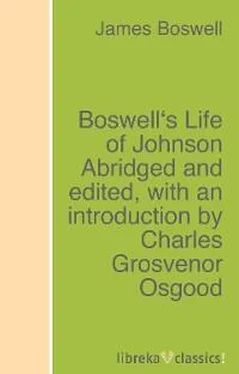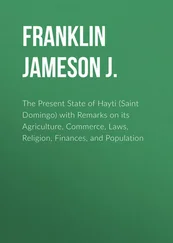James Boswell - Boswell's Life of Johnson Abridged and edited, with an introduction by Charles Grosvenor Osgood
Здесь есть возможность читать онлайн «James Boswell - Boswell's Life of Johnson Abridged and edited, with an introduction by Charles Grosvenor Osgood» — ознакомительный отрывок электронной книги совершенно бесплатно, а после прочтения отрывка купить полную версию. В некоторых случаях можно слушать аудио, скачать через торрент в формате fb2 и присутствует краткое содержание. Жанр: unrecognised, на английском языке. Описание произведения, (предисловие) а так же отзывы посетителей доступны на портале библиотеки ЛибКат.
- Название:Boswell's Life of Johnson Abridged and edited, with an introduction by Charles Grosvenor Osgood
- Автор:
- Жанр:
- Год:неизвестен
- ISBN:нет данных
- Рейтинг книги:4 / 5. Голосов: 1
-
Избранное:Добавить в избранное
- Отзывы:
-
Ваша оценка:
- 80
- 1
- 2
- 3
- 4
- 5
Boswell's Life of Johnson Abridged and edited, with an introduction by Charles Grosvenor Osgood: краткое содержание, описание и аннотация
Предлагаем к чтению аннотацию, описание, краткое содержание или предисловие (зависит от того, что написал сам автор книги «Boswell's Life of Johnson Abridged and edited, with an introduction by Charles Grosvenor Osgood»). Если вы не нашли необходимую информацию о книге — напишите в комментариях, мы постараемся отыскать её.
Boswell's Life of Johnson Abridged and edited, with an introduction by Charles Grosvenor Osgood — читать онлайн ознакомительный отрывок
Ниже представлен текст книги, разбитый по страницам. Система сохранения места последней прочитанной страницы, позволяет с удобством читать онлайн бесплатно книгу «Boswell's Life of Johnson Abridged and edited, with an introduction by Charles Grosvenor Osgood», без необходимости каждый раз заново искать на чём Вы остановились. Поставьте закладку, и сможете в любой момент перейти на страницу, на которой закончили чтение.
Интервал:
Закладка:
It was suggested that Kings must be unhappy, because they are deprived of the greatest of all satisfactions, easy and unreserved society. JOHNSON. 'That is an ill-founded notion. Being a King does not exclude a man from such society. Great Kings have always been social. The King of Prussia, the only great King at present, is very social. Charles the Second, the last King of England who was a man of parts, was social; and our Henrys and Edwards were all social.'
Mr. Dempster having endeavoured to maintain that intrinsick merit OUGHT to make the only distinction amongst mankind. JOHNSON. 'Why, Sir, mankind have found that this cannot be. How shall we determine the proportion of intrinsick merit? Were that to be the only distinction amongst mankind, we should soon quarrel about the degrees of it. Were all distinctions abolished, the strongest would not long acquiesce, but would endeavour to obtain a superiority by their bodily strength. But, Sir, as subordination is very necessary for society, and contentions for superiority very dangerous, mankind, that is to say, all civilized nations, have settled it upon a plain invariable principle. A man is born to hereditary rank; or his being appointed to certain offices, gives him a certain rank. Subordination tends greatly to human happiness. Were we all upon an equality, we should have no other enjoyment than mere animal pleasure.'
He took care to guard himself against any possible suspicion that his settled principles of reverence for rank and respect for wealth were at all owing to mean or interested motives; for he asserted his own independence as a literary man. 'No man (said he) who ever lived by literature, has lived more independently than I have done.' He said he had taken longer time than he needed to have done in composing his Dictionary. He received our compliments upon that great work with complacency, and told us that the Academia della Crusca could scarcely believe that it was done by one man.
At night* Mr. Johnson and I supped in a private room at the Turk's Head coffee-house, in the Strand. 'I encourage this house (said he;) for the mistress of it is a good civil woman, and has not much business.'
'Sir, I love the acquaintance of young people; because, in the first place, I don't like to think myself growing old. In the next place, young acquaintances must last longest, if they do last; and then, Sir, young men have more virtue than old men: they have more generous sentiments in every respect. I love the young dogs of this age: they have more wit and humour and knowledge of life than we had; but then the dogs are not so good scholars. Sir, in my early years I read very hard. It is a sad reflection, but a true one, that I knew almost as much at eighteen as I do now. My judgement, to be sure, was not so good; but I had all the facts. I remember very well, when I was at Oxford, an old gentleman said to me, "Young man, ply your book diligently now, and acquire a stock of knowledge; for when years come upon you, you will find that poring upon books will be but an irksome task."'
He again insisted on the duty of maintaining subordination of rank. 'Sir, I would no more deprive a nobleman of his respect, than of his money. I consider myself as acting a part in the great system of society, and I do to others as I would have them to do to me. I would behave to a nobleman as I should expect he would behave to me, were I a nobleman and he Sam. Johnson. Sir, there is one Mrs. Macaulay* in this town, a great republican. One day when I was at her house, I put on a very grave countenance, and said to her, "Madam, I am now become a convert to your way of thinking. I am convinced that all mankind are upon an equal footing; and to give you an unquestionable proof, Madam, that I am in earnest, here is a very sensible, civil, well-behaved fellow-citizen, your footman; I desire that he may be allowed to sit down and dine with us." I thus, Sir, shewed her the absurdity of the levelling doctrine. She has never liked me since. Sir, your levellers wish to level DOWN as far as themselves; but they cannot bear levelling UP to themselves. They would all have some people under them; why not then have some people above them?' I mentioned a certain authour who disgusted me by his forwardness, and by shewing no deference to noblemen into whose company he was admitted. JOHNSON. 'Suppose a shoemaker should claim an equality with him, as he does with a Lord; how he would stare. "Why, Sir, do you stare? (says the shoemaker,) I do great service to society. 'Tis true I am paid for doing it; but so are you, Sir: and I am sorry to say it, paid better than I am, for doing something not so necessary. For mankind could do better without your books, than without my shoes." Thus, Sir, there would be a perpetual struggle for precedence, were there no fixed invariable rules for the distinction of rank, which creates no jealousy, as it is allowed to be accidental.'
He said he would go to the Hebrides with me, when I returned from my travels, unless some very good companion should offer when I was absent, which he did not think probable; adding, 'There are few people to whom I take so much to as you.' And when I talked of my leaving England, he said with a very affectionate air, 'My dear Boswell, I should be very unhappy at parting, did I think we were not to meet again.' I cannot too often remind my readers, that although such instances of his kindness are doubtless very flattering to me; yet I hope my recording them will be ascribed to a better motive than to vanity; for they afford unquestionable evidence of his tenderness and complacency, which some, while they were forced to acknowledge his great powers, have been so strenuous to deny.
He maintained that a boy at school was the happiest of human beings. I supported a different opinion, from which I have never yet varied, that a man is happier; and I enlarged upon the anxiety and sufferings which are endured at school. JOHNSON. 'Ah! Sir, a boy's being flogged is not so severe as a man's having the hiss of the world against him.'
On Tuesday, July 26, I found Mr. Johnson alone. It was a very wet day, and I again complained of the disagreeable effects of such weather. JOHNSON. 'Sir, this is all imagination, which physicians encourage; for man lives in air, as a fish lives in water; so that if the atmosphere press heavy from above, there is an equal resistance from below. To be sure, bad weather is hard upon people who are obliged to be abroad; and men cannot labour so well in the open air in bad weather, as in good: but, Sir, a smith or a taylor, whose work is within doors, will surely do as much in rainy weather, as in fair. Some very delicate frames, indeed, may be affected by wet weather; but not common constitutions.'
We talked of the education of children; and I asked him what he thought was best to teach them first. JOHNSON. 'Sir, it is no matter what you teach them first, any more than what leg you shall put into your breeches first. Sir, you may stand disputing which is best to put in first, but in the mean time your breech is bare. Sir, while you are considering which of two things you should teach your child first, another boy has learnt them both.'
On Thursday, July 28, we again supped in private at the Turk's Head coffee-house. JOHNSON. 'Swift has a higher reputation than he deserves. His excellence is strong sense; for his humour, though very well, is not remarkably good. I doubt whether The Tale of a Tub be his; for he never owned it, and it is much above his usual manner.'
'Thomson, I think, had as much of the poet about him as most writers. Every thing appeared to him through the medium of his favourite pursuit. He could not have viewed those two candles burning but with a poetical eye.'
'As to the Christian religion, Sir, besides the strong evidence which we have for it, there is a balance in its favour from the number of great men who have been convinced of its truth, after a serious consideration of the question. Grotius was an acute man, a lawyer, a man accustomed to examine evidence, and he was convinced. Grotius was not a recluse, but a man of the world, who certainly had no bias to the side of religion. Sir Isaac Newton set out an infidel, and came to be a very firm believer.'
Читать дальшеИнтервал:
Закладка:
Похожие книги на «Boswell's Life of Johnson Abridged and edited, with an introduction by Charles Grosvenor Osgood»
Представляем Вашему вниманию похожие книги на «Boswell's Life of Johnson Abridged and edited, with an introduction by Charles Grosvenor Osgood» списком для выбора. Мы отобрали схожую по названию и смыслу литературу в надежде предоставить читателям больше вариантов отыскать новые, интересные, ещё непрочитанные произведения.
Обсуждение, отзывы о книге «Boswell's Life of Johnson Abridged and edited, with an introduction by Charles Grosvenor Osgood» и просто собственные мнения читателей. Оставьте ваши комментарии, напишите, что Вы думаете о произведении, его смысле или главных героях. Укажите что конкретно понравилось, а что нет, и почему Вы так считаете.












